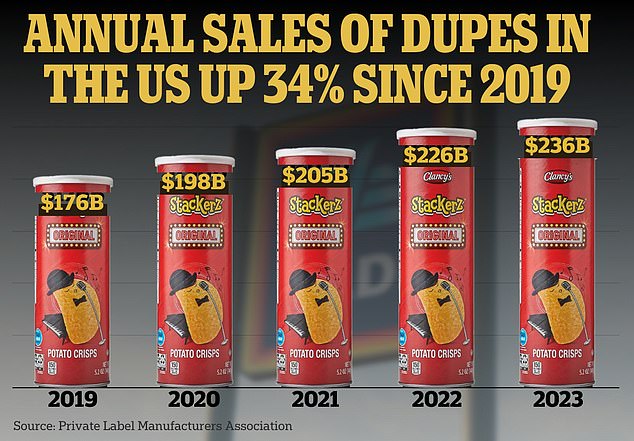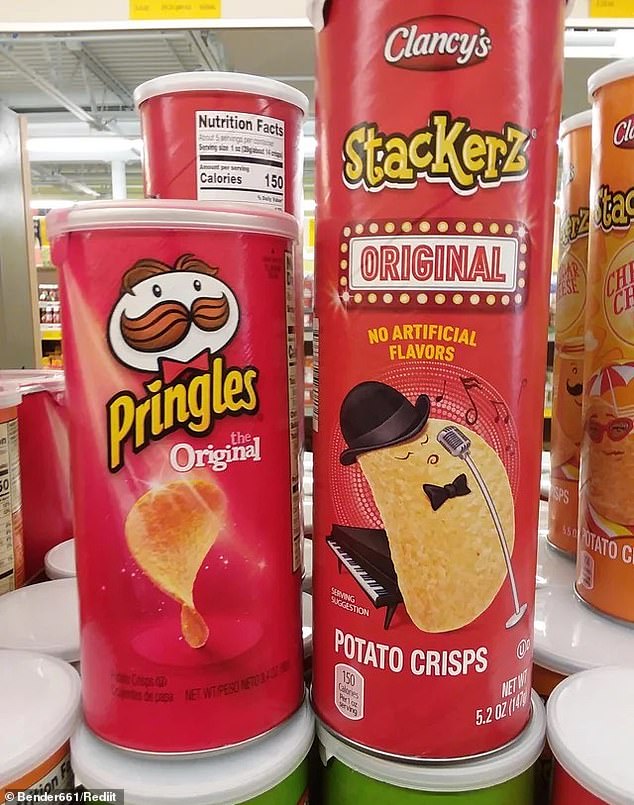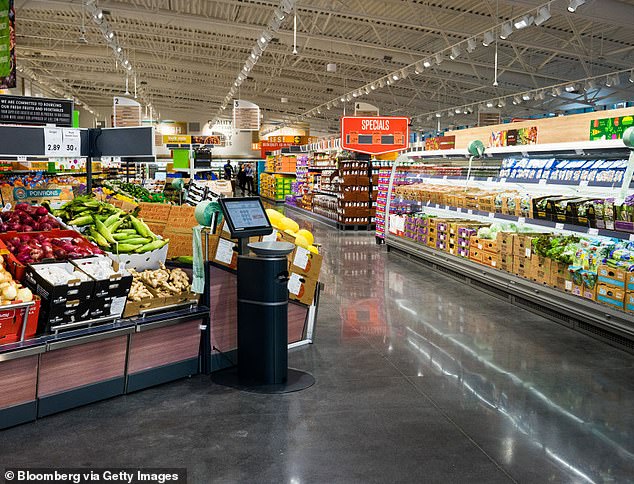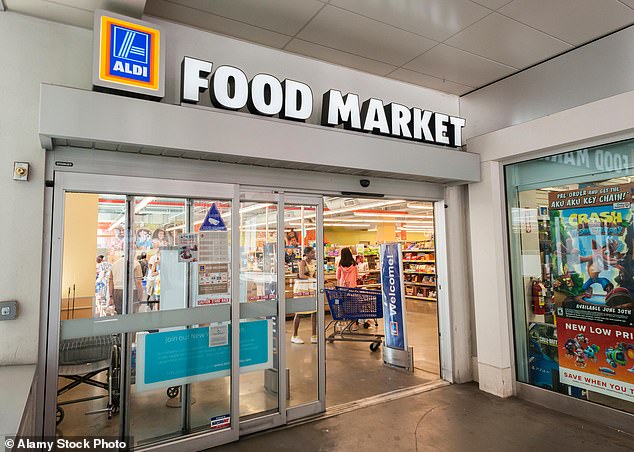German supermarket chain Aldi is expanding across the United States at breakneck speeds thanks to a unique business model that Americans are enjoying.
Some 2,400 of its small stores, stocked with a limited range of well-selected but mostly private-label products, are now spread across the country, and it plans to open another 800 over the next four years.
The retailer was recently named the The fastest growing grocery store in the US for the fifth year in a row according to real estate firm JLL and, in terms of number of stores, it is the third largest.
“No one else is opening 100 stores a year in the grocery sector,” said Michael Infranco, assistant vice president of RetailStat.
‘That is amazing. And they’ve been doing it for several years.”
Aldi is the fastest growing supermarket chain in the United States and plans to open another 800 locations in the next four years. Pictured is an Aldi food market in East Harlem.

Aldi has benefited from a growing market for imitation products in the US, something it specialized in as it conquered much of Europe.
Although the retailer has been in the United States since 1976, it has only recently begun to capture a larger share of the market.
The driver of its popularity has been inflation, which forced consumers to look for substitutes for increasingly expensive brand-name products such as Heinz Ketchup, Kellogg’s Frosted Flakes and soft drinks such as Coca-Cola.
On the other hand, Aldi offers much cheaper imitation products, which it has sold for many years in Europe.
The chain also has experience in terms of rapid expansion.
In the last decade, it has more than quadrupled its market share in the UK to 10 per cent, according to Kantar data.
Demand from dupes has also skyrocketed in North America. The volume of private label products sold by American grocery stores has increased about 34 percent since 2019.
“Aldi definitely benefited from a U.S. market that is receptive to private label products,” Infranco said.
For example, Aldi’s own brand ketchup comes in packaging that looks similar to the Heinz product, but is about half the price.
A 38-ounce bottle of Burman’s brand ketchup can cost about $1.35, while the same size bottle from Heinz at Kroger typically costs more than $3.
An Aldi in Milwaukee, Wisconsin, sells Clancy’s brand chips that look a lot like Pringles for just $1.89, while the original product costs $2.85 at the same store.

Aldi is known for selling various imitation products at significantly reduced prices. Pictured, Pringles on the left and the Aldi knockoff product on the right.

Jason Hart, CEO of Aldi USA, said there was demand for well-priced products as inflation has made food increasingly unaffordable.
Aldi also sells staples such as eggs, milk, sugar, flour and pasta, and has a devoted following. One fan is Lydia Beiler, author of the blog Thrifty Frugal Mom.
He even created a Meal plan Based on Aldi’s essentials: “Seven dinners under $50 for a family of five.”
Also fueling its rise was its “aisle of shame,” a central aisle in the middle of its stores filled with fairly random items like kitchen utensils, toys and home decor.
Aldi stores are smaller than most supermarket chains and average around 10,000 square feet. Additionally, they only stock around 12,000 different products, which are placed in their delivery boxes to reduce the need for staff.
“It’s utilitarian,” Infranco said. “You don’t have 12 versions of an Oreo cookie with different fillings, you have one type of cookie, and that saves shelf space and money that would be spent on distribution and inventory.”
This approach sets it apart from other famous retail giants that offer a more complete supermarket experience.
“In their space, I think they are king of the hill, but they are not taking down Walmart or Kroger in the short term,” Infranco said. “In general, people who shop at Aldi or Lidl do the rest of their shopping elsewhere.”
However, Aldi’s lesser-known German rival, Lidl, has been a little less successful. Last year it closed 10 underperforming stores and laid off about 200 employees.
Having entered the US in 2017, in just seven years it has gone through five CEOs as it seeks to find its place in a notoriously difficult market.

Lidl is known for its selection of fresh fruits and vegetables, as well as its European baked goods.
‘Aldi has first-mover advantage. He established himself in the US long before Lidl and that has given him an advantage, especially in terms of brand recognition,” said Neil Saunders, CEO of GlobalData.
‘Aldi has also been smart in terms of expansion. “He has selected neighborhoods where there are American workers who will be interested in his proposal,” he added.
A recent report from analytics company Placer.ai found that Aldi serves low-income households more. Lidl stores also tend to be larger in terms of square footage and inventory.
Aldi’s planned expansion will be accelerated by last year’s acquisition of Winn-Dixie and Harvey’s Supermarket, which together operate more than 600 stores across the Southeast.
About 50 of them will become Aldi locations in the second half of the year and will open in 2025. Many will also remain under their existing franchises, Aldi said.
According to Infranco, what he does with those Winn-Dixie and Harvey’s Supermarket locations will dictate his next steps, as they are larger than the existing stores.
“They definitely have a plan that we don’t know about yet,” Infranco said.
‘But I’m a little worried that they also want to be traditional shopkeepers. When companies deviate from what they do really well, they don’t always tend to do it as well.’


